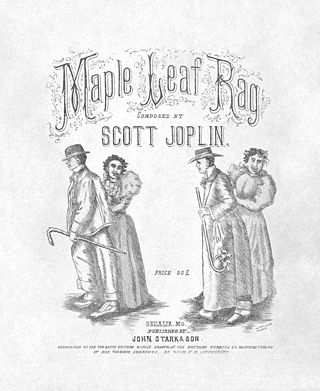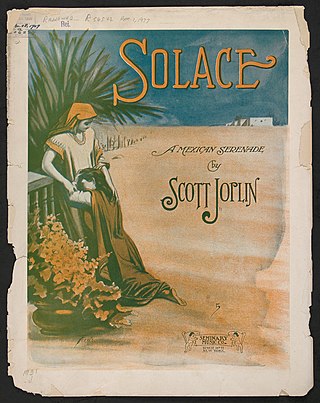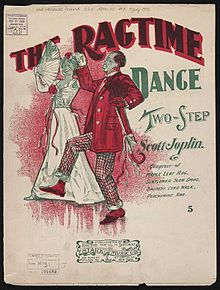
Ragtime, also spelled rag-time or rag time, is a musical style that had its peak from the 1890s to 1910s. Its cardinal trait is its syncopated or "ragged" rhythm. Ragtime was popularized during the early 20th century by composers such as Scott Joplin, James Scott, and Joseph Lamb. Ragtime pieces are typically composed for and performed on piano, though the genre has been adapted for a variety of instruments and styles.

Scott Joplin was an American composer and pianist. Dubbed the "King of Ragtime", he composed more than 40 ragtime pieces, one ragtime ballet, and two operas. One of his first and most popular pieces, the "Maple Leaf Rag", became the genre's first and most influential hit, later being recognized as the quintessential rag. Joplin considered ragtime to be a form of classical music meant to be played in concert halls and largely disdained the performance of ragtime as honky tonk music most common in saloons.

The Sting is a 1973 American heist film directed by George Roy Hill and starring Paul Newman, Robert Redford and Robert Shaw. Set in September 1936, involving a complicated plot by two professional grifters to con a mob boss (Shaw). Hill had previously directed Newman and Redford in the Western Butch Cassidy and the Sundance Kid (1969). The screenplay, written by David S. Ward, inspired by real-life cons perpetrated by brothers Fred and Charley Gondorff and documented by David Maurer in his 1940 book The Big Con: The Story of the Confidence Man.

James Sylvester Scott was an American ragtime composer and pianist. He is regarded as one of the "Big Three" composers of classical ragtime along with Scott Joplin and Joseph Lamb.

William Elden Bolcom is an American composer and pianist. He has received the Pulitzer Prize, the National Medal of Arts, a Grammy Award, the Detroit Music Award and was named 2007 Composer of the Year by Musical America. He taught composition at the University of Michigan from 1973 until 2008. He is married to mezzo-soprano Joan Morris.

The "Maple Leaf Rag" is an early ragtime musical composition for piano composed by Scott Joplin. It was one of Joplin's early works, becoming the model for ragtime compositions by subsequent composers. It is one of the most famous of all ragtime pieces. Its success led to Joplin being dubbed the "King of Ragtime" by his contemporaries. The piece gave Joplin a steady if unspectacular income for the rest of his life.

Nonesuch Records is an American record company and label owned by Warner Music Group, distributed by Warner Records, and based in New York City. Founded by Jac Holzman in 1964 as a budget classical label, Nonesuch has developed into a label that records critically acclaimed music from a wide range of genres. Robert Hurwitz was president of the company from 1984 to 2017.

"The Entertainer" is a 1902 classic piano rag written by Scott Joplin.
Joshua Rifkin is an American conductor, pianist, and musicologist. He is currently a professor of music at Boston University. As a performer he has recorded music by composers from Antoine Busnois to Silvestre Revueltas; as a scholar has published research on composers from the Renaissance to the 20th century.
Richard “Dick” Zimmerman is a ragtime performer, historian, author and producer. He is regarded as being one of the key figures responsible for the worldwide revival of ragtime. Zimmerman is the first pianist to have recorded the complete works of Scott Joplin and in 1987 was awarded the first place prize “Champion Ragtime Performer of the World”. Zimmerman was technical advisor for the film Scott Joplin. He is a founder of the "Maple Leaf Club", and is the editor of its publication, "The Rag Times". Zimmerman is also a professional magician. He has contributed many signature illusions to the field of magic and has acted as consultant for such magicians as David Copperfield.

"Magnetic Rag" is a 1914 ragtime piano composition by American composer Scott Joplin. It is significant for being the last rag which Joplin published in his lifetime, three years before his death in 1917. It is also unique in form and in some of the musical techniques employed in the composition.

"Root Beer Rag" is a composition from Billy Joel's 1974 album Streetlife Serenade. An instrumental track in a very fast ragtime style, it was later released as the B-side of several singles from Joel's 52nd Street album, including "Big Shot" in the US, "Until the Night" in the UK, and "Honesty" in Japan and some European countries. A live version was included with the DVD that was part of the 30th anniversary re-release of The Stranger.

"Bethena, A Concert Waltz" is a composition by Scott Joplin. It was the first Joplin work since his wife Freddie's death on September 10, 1904, of pneumonia, ten weeks after their wedding. At the time the composer had significant financial problems; the work did not sell successfully at the time of publication and was soon neglected and forgotten. It was rediscovered as a result of the Joplin revival in the 1970s and has received acclaim from Joplin's biographers and other critics. The piece combines two different styles of music, the classical waltz and the rag, and has been seen as demonstrating Joplin's excellence as a classical composer. The work has been described as "an enchantingly beautiful piece that is among the greatest of Ragtime Waltzes", a "masterpiece", and "Joplin's finest waltz".

Piano Rags by Scott Joplin is an album by Joshua Rifkin consisting of ragtime compositions by Scott Joplin, released by Nonesuch Records in 1970. The spine of the original album and various compact disc reissues render the title as Scott Joplin: Piano Rags.
The New England Ragtime Ensemble was a Boston chamber orchestra dedicated to the music of Scott Joplin and other ragtime composers.
Elite Syncopations is a one-act ballet created in 1974 by Kenneth MacMillan for The Royal Ballet.

"Solace" is a 1909 habanera written by Scott Joplin.
Maple Leaf Rag is a storyless Martha Graham ballet set to ragtime compositions by Scott Joplin. The work premiered on October 2, 1990 at New York City Center with costumes by Calvin Klein and lighting by David Finley. Chris Landriau arranged the music and played piano at the debut. The dance is a jubilant self-parody and an homage, of sorts, to Graham's mentor and musical director, Louis Horst, who would play the rag for her whenever she fell into a creative slump. Graham was 96 when she created Maple Leaf Rag; it is her last completed dance. In 1991, she began another work, The Eyes of the Goddess, but it was unfinished at the time of her death.

Scott Joplin: The Red Back Book is an album by the New England Ragtime Ensemble conducted by Gunther Schuller featuring the music of Scott Joplin arranged by E.J. Stark and D.S. De Lisle. The "Red Back Book" of the album title is taken from the popular name for the collection of band arrangements of ragtime music featuring Joplin's music, "Standard High-Class Rags" published by the Stark Music Company of St. Louis around 1912. The name came from the red color of the front and back cover.














